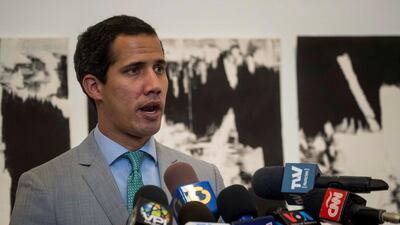Venezuela's socialist government said Wednesday it had derailed a coup bid, claiming the United States, Colombia and Chile colluded in a military plot to assassinate President Nicolas Maduro and install a general and former defence minister in his place.
Mr Maduro warned that he would be "ruthless in a revolutionary counter-offensive against an attempted fascist coup — ruthless!"
In a speech broadcast nationwide on radio and television, an agitated Mr Maduro denounced a "fascist attempt to assassinate me" — and lashed out at Colombian President Ivan Duque saying his "complicity" was "evident."
Venezuelan Communications Minister Jorge Rodriguez earlier said the alleged coup involved active duty and retired military officers, and was to have been executed between Sunday and Monday this past weekend.
"We were in all the meetings to plan the coup d'Etat. We were in all the conferences," he said, suggesting informers had infiltrated the alleged plotters — at least six of whom had been detained.
In his televised speech, Mr Rodriguez also accused opposition leader Juan Guaido of planning "a bloodbath."
Mr Guaido for his part dismissed the coup claims as fiction, saying the media had "lost count" of how many times the same accusations had been repeated.
Recognised by the United States and more than 50 countries as the country's interim president, Mr Guaido said he would continue to call on the armed forces to abandon Mr Maduro.
Mr Rodriguez accused Colombia's Duque of being closely involved in the alleged plot, and implicated Chilean President Sebastian Pinera and US National Security Advisor John Bolton.
Without referring directly to the charge, Colombia's foreign minister, Carlos Holmes Trujillo, said his country would "continue to act through political and diplomatic means" in Venezuela.
Mr Rodriguez presented testimony from one of the detainees — Lieutenant Carlos Saavedra, identified as the nephew of retired General Ramon Saavedra, who was arrested Wednesday by Venezuelan intelligence agents.
According to Mr Rodriguez, surveillance of the plotters and Mr Saavedra's recorded "confession" revealed that the plan envisaged the takeover of three military bases, including La Carlota airbase in Caracas.
The plotters hoped to spring Raul Baduel — a former defence minister under late president Hugo Chavez — from jail to proclaim him president, Rodriguez said.
Mr Maduro demoted Baduel last year as part of a purge of senior military officers, which also included another general, Antonio Rivero, allegedly another leader of the coup bid.
The head of the National Assembly, Mr Guaido proclaimed himself Venezuela's interim president in January on the grounds Mr Maduro's 2018 re-election was illegitimate.
Venezuelan authorities recently said that 17 people had been charged with attempting a coup on April 30, during Guaido's failed attempt to inspire a military uprising.
Only some 30 military personnel joined Mr Guaido, and the revolt fizzled after two days of deadly clashes.
Several people close to Mr Guaido have since been detained, though not the lawmaker himself.
However, in the wake of Rodriguez's accusations, he told reporters he had "frustrated" an attempt to kidnap several members of his entourage on a Caracas highway. The kidnappers were armed and "dressed as civilians" he said.
Rodriguez also accused Mr Maduro's former intelligence chief Cristopher Figuera — who has defected to the United States — of seeking "hundreds of thousands of dollars" for supporting the abortive uprising.
Figuera "turned out to be a mercenary," Rodriguez said.
In a series of shock claims made to US media, Figuera said members of Mr Maduro's family and his government were engaged in money laundering and corruption, and alleged Hezbollah cells were allowed to operate in Venezuela and raise funds.
On Wednesday Ivan Simonovis, a former Venezuelan national police chief who fled house arrest in Caracas where he was being held on murder charges, was in Washington to talk to US lawmakers about "criminal activities" of the Maduro government. He backed up many of Figuera's allegations.
Washington has imposed crippling sanctions on Mr Maduro's government, holding the president responsible for the collapse of the Latin American oil giant, which has seen millions flee amid widespread shortages of basic goods and medicines.

